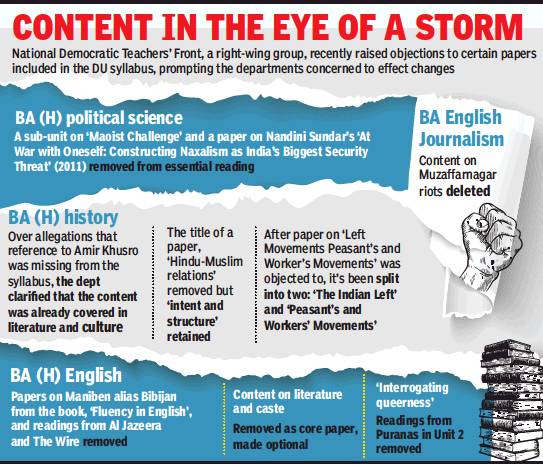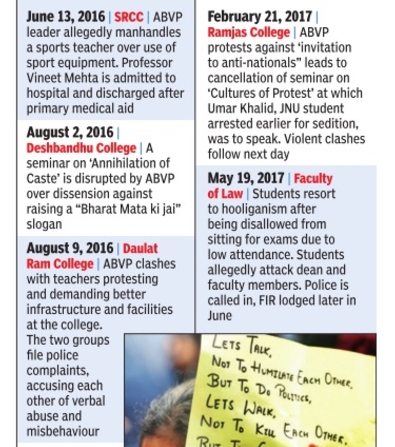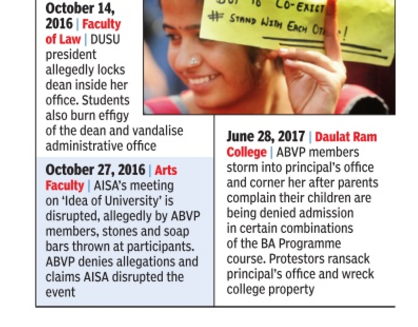Delhi University: history
This is a collection of articles archived for the excellence of their content. |
This page is under construction
Contents |
Four-year undergraduate programme (FYUP)
Sequence of events 2013-14
Vice Chancellor Dinesh Singh's attempt to synchronise DU's undergraduate course with international norms met with fierce resistance and the FYUP was scuttled in June 2014 after a year-long conflict between its supporters and opponents.
Here is the background and sequence of events:
10 things you must know about Delhi University’s four-year undergraduate programme
The Times of India TNN | Jun 25, 2014
Since 2013, Delhi University's four-year undergraduate programme has been in the news for various reasons. City-wide protests by students and teacher organizations, the fact that DU in fact admitted students into the programme in 2013 despite the uproar, and finally the stepping in of University Grants Commission (UGC) to scrap FYUP are the key highpoints underlining this controversial programme.
In June 2014, Delhi University colleges, slowly but surely started switching back from the controversial four-year undergraduate programme (FYUP) to the three-year course. 57 of the university's 64 colleges quietly communicated to UGC that they were moving back to the three-year course.
Here are 10 facts about the controversy surrounding DU's FYUP programme:
1) The Delhi high court in June 2014 fixed the petition on the FYUP-UGC issue for hearing on July 1.
2) 57 of the university's 64 colleges have 'quietly' communicated to UGC that they were moving back to the three-year course. These colleges include Hindu College, Lady Shri Ram, Shri Ram College of Commerce, Miranda House, Venkateswara and Kirori Mal. UGC followed up by asking DU authorities to immediately write to these colleges to begin admission under the three-year programme.
3) Meanwhile, UGC's missive to DU to ask colleges to begin admission under the three-year course could result in another war of nerves. Late in the evening, VC Dinesh Singh, pro-VC Sudesh Pachauri, registrar Alka Sharma and other officials reportedly met to plan their next move. University authorities, sources said, refused to take UGC's latest letter.
4) Responding to the anxiety of BTech students, whose course will be scrapped under the three-year graduation system, UGC said, "Students who feel they will be denied a BTech degree if the three-year course is introduced should not worry. Their interest will be fully safeguarded. They are being egged on by the DU authorities to agitate."
5) Delhi University administration's refusal to officially clarify anything relating to the current admission mess is leaving many DU hopefuls — especially those from other cities-in the lurch. DU admissions were to begin on June 24.
6) The Supreme Court on Tuesday declined to entertain a petition challenging the University Grants Commission's direction to Delhi University to scrap the four-year undergraduate programme (FYUP). Instead, a bench comprising Justices Vikramjit Sen and S K Singh suggested to the petitioner, Aditya Narayan Mishra, who is an assistant professor at Aurobindo College, to approach Delhi high court first.
7) Delhi University VC Dinesh Singh's fate hangs in the balance as it is not clear whether he has resigned or not. DU spokesman Malay Neerav texted a one-line message which said, "VC has resigned". This was followed by 'news' of the resignations of DU proVC Sudesh Pachauri and dean Umesh Rai. Since the VC's resignation had to come to the HRD ministry, officials there got into a huddle to finalize their next move. But as minutes and hours went by, Singh's resignation did not reach the ministry. "DU VC is playing a mind-game and successfully managed to spend another day without bothering about the fate of students," said a ministry official.
8) Protests continue to take place in DU. Those in favour of FYUP want to keep the pressure on; so they — mainly teachers' group like Academics for Action and Development (Aditya Mishra) — sat on a hunger strike. As news of the VC's resignation — which later turned out to be dubious — spread, there were celebrations and exchange of congratulatory messages.
9) Many are shocked at UGC's U-turn on FYUP that came into force in the last academic session. UGC along with a set of HRD officials, led by present education secretary Ashok Thakur, was at the forefront of celebrating FYUP last year. Not long ago, UGC chairperson Ved Prakash at a function in DU campus showered praise on VC Dinesh Singh and FYUP.
10) There seems to be no agreement between the central and state leaderships of Congres on the issue of rollback of FYUP. Senior Congres leader Ghulam Nabi Azad described UGC's directive as a decision taken in "haste" while another Congres leader, Manish Tewari, accused the NDA-led Central government of "trampling (on) and trifling (with)" the autonomy of a premium academic institution like Delhi University.
How the FYUP was scuttled: June 2014
Old letter won UGC FYUP war
Akshaya Mukul New Delhi
The Times of India Jun 28 2014
In the war of nerves that played out for a week, a single letter of July 30, 2013 written by a junior HRD ministry official to the registrar of Delhi University helped the University Grants Commission win the battle over the Four Year Undergraduate Programme (FYUP). In the letter, the junior woman official raised questions that seniors in the minis try had overlooked or willfully ignored. Reminding the registrar that ordinances of university are submitted to university court and the visitor after the approval of the executive council, she told the university that it was not clear if approval of the EC in May and June, 2013 was placed before the university court.
She also told DU registrar that Baccalaureate degree under FYUP exists in booklet of ordinances despite the fact that the university had informed the ministry that such a degree is being dropped. DU was asked to clarify on these matters and also send resolution of the academic council/executive council and university court on the amendments to the ordinanc es. On its part, the DU administration chose to completely disregard the ministry’s letter. Visitor’s approval would not have happened without these documents.
It also made FYUP illegal.
In the current imbroglio, every time UGC asked DU to furnish proof of Visitor’s approval or reply to HRD’s communication of July 30, 2013, university obfuscated it by stating that it is a Left conspiracy. “We were on facts, DU alleged conspiracy. We knew it will be a tough battle. DU ignored our repeated directives and tried to expand the scope of the subject by bringing in issues extraneous to FYUP. For commission it was an illegal course and had to be scrapped,” one UGC official said.
However, on Thursday, UGC nearly succumbed to the proposal of some academicians considered close to vice-chancellor Dinesh Singh. The proposal was for blending three-year undergraduate courses with FYUP. After intense discussion, the commission felt that in the larger interest of students it should accept the proposal for three-years honours/pass course and keep some courses, especially in science and technology, under FYUP.
After being finalized, UGC’s reply was shown to a lawyer who asked how can the commission declare FYUP to be illegal on one hand and accept parts of it on the other. More discussions followed and it was decided that DU proposal should be rejected completely. UGC took few more hours to firm up its directive to DU. With students and teachers agitating on the streets and more than a lakh admission-seekers facing Delhi heat and uncertainty in DU, the university administration finally succumbed on the morning of June 27.
Student violence
2016-17
BATTLEFIELD CAMPUS|Jul 14 2017 : The Times of India (Delhi)
Syllabus issues
2019: Article on Naxalism junked, concessions in other subjects
Mohammad Ibrar, August 2, 2019: The Times of India

From: Mohammad Ibrar, August 2, 2019: The Times of India
For the third time, an article by sociologist Nandini Sundar has been removed from the syllabus of Delhi University where she teaches. The professor’s 2011 article titled ‘At War with Oneself: Constructing Naxalism as India’s Biggest Security Threat’ was included in Michael Kugelman’s ‘India’s Contemporary Security Challenges’. The political science department has removed it from its syllabus. This was revealed in a document accessed by TOI that was submitted to the university’s Executive Council (EC) on July 20.
The English, history and sociology departments have also revised their syllabi for DU’s learning outcome-based curriculum framework after a series of protests by members of the right-wing National Democratic Teachers’ Front (NDTF) and ABVP.
Sunil Sharma, member of DU’s Academic Council (AC) and NDTF, had objected to Sundar’s article in an AC meeting on July 16. He had said, “In the political science syllabus, Naxalism has been shown as a social movement despite the government banning all Maoist organisations. It is urban Naxals like Nandini Sundar who put this in the syllabus to sully the minds of young students. It is not a social movement but a violent and bloody movement.”
Responding to the news, Sundar said, “Whoever is objecting is not objecting on academic grounds. I have nothing more to say.” She added that along with her piece, the entire aspect on the Maoist movement had been removed from syllabus—a fact borne out by the documents accessed by TOI that says that a whole sub-unit on ‘Maoist Challenge’ was removed.
But Sharma said they had an “academic argument” and “we informed that Naxalism should not be taught due to its bloody nature”.
A member of the political science department confirmed the development to TOI but the department head did not respond to queries.
The fracas over syllabus started on July 11 when contents of four course were objected to by NDTF members during a meeting of the standing committee on academic matters. In the July 16 AC meeting, there was ruckus with ABVP members entering the venue as well, protesting against “leftist” content in the syllabus.
BA history honours syllabus was hauled up for a paper on ‘Left Movements; Peasants’ and Workers’ Movements’. According to the EC document, it has been split into two — ‘The Indian Left’ and ‘Peasants’ and Workers’ Movements’. Sunil Kumar, head of history, said, “A course can always be improved. But this revision has been made into a negative process as it is due to politics.”
Since the opponents claimed the sociology syllabus had a “lack of Indian ethos”, the department added ‘Idea of India during Ancient Times’ and ‘Nation Building in India’ as part of its core papers.
The English department has also revised its syllabus. It has dropped a Gujarat riots story, shifted the ‘Literature and Caste’ paper from core to optional, and also removed readings from the Puranas in the ‘Interrogating Queerness’ paper, the latter because it was accused of hurting religious sentiments.
“We have passed the syllabus twice through the faculty and the committee of courses. I am hopeful that the oversight committee will approve the syllabus,” said English department head Raj Kumar.
The final call on the syllabus will be taken by the oversight committee. Maharaj K Pandit, the head of the committee, told TOI, “We have received the syllabus from the departments on Wednesday and we will review and come out with a final decision in the next couple of days.”
YEAR-WISE DEVELOPMENTS
2020
VC vs. pro-VC
Shradha Chettri, October 22, 2020: The Times of India
The drama of the absurd unfolded at Delhi University with two vice-chancellors, two registrars and two directors of South Campus in the saddle at the same time. Or so it seemed, shorn of the legalities. This was the fallout of a power tussle between vice-chancellor Yogesh Tyagi and pro vice-chancellor P C Joshi which threatens to disrupt the functioning of the university.
VC Yogesh Tyagi approved — and through the joint registrar (establishment) — notified the appointment of PC Jha of the department of operational research as director, South Campus, and acting registrar. “He is being appointed in place of Suman Kundu of the department of biochemistry with immediate effect,” the letter read.
Kundu had been appointed by Joshi in the absence of Tyagi, who was undergoing medical treatment.
Pro VC cannot preside over an EC meeting: DU teachers
Joshi had himself been appointed by Tyagi as pro VC on June 28. The position is co-terminus with that of the VC. Going by the university statute, the pro VC looks after the day-to-day functioning in the absence of the VC.
As Jha took over as registrar, he postponed the executive council meeting scheduled for Wednesday. In his letter, he said the agenda items has not been revised as asked for by the competent authority, i.e. the VC.
Joshi, however, had other plans. He wrote a letter to Jha, titled “Illegal occupation of registrar office”. It read: “You are hereby directed to vacate the office of the registrar, which has been illegally occupied by you since the morning of October 21. The act on your part is hampering the functioning of the university. In case you are not vacating the office immediately (sic), you will be forcibly moved out of office and action initiated against you.”
He signed the letter as “vice-chancellor (acting)”. Meanwhile, police landed up at the Viceregal Lodge, which houses the VC’s office. Nothing came of it. “The acting vice-chancellor is appointed by the visitor of the university, who is President of India. No such appointment has been made. And, when the appointed VC is still in office, why is there a need for an acting VC?” asked a university official who didn’t wish to be quoted. Undeterred by the new registrar’s letter, Joshi went ahead with the EC meeting. The agenda included appointment of registrar and finance officer, promotions in various departments, and appointment of principals in many colleges. According to sources, the EC had to also nominate two members for the search committee for appointment of the new vice-chancellor. Tyagi’s term ends in March 2021.
At the meeting, Joshi notified that Vikash Gupta was to be appointed as registrar and Girish Ranjan as finance officer. A resolution was moved that Kundu will function as director, South Campus, and registrar till permanent/ new appointees joined the university.
Teachers and former members of the statutory body said that a pro VC cannot preside over an EC meeting. An EC meeting had been stopped midway on October 10 as well. Shriram Oberoi, former DUTA president who has now retired, said: “As far as the law is concerned, vice-chancellor Yogesh Tyagi is still in his post and not on leave. Statue 11 H (5) states that “subject to the control and supervision of the vice-chancellor, the pro vicechancellor shall perform such duties and exercise such functions and powers as the vice-chancellor may specify generally or in individual cases and shall assist the vice-chancellor on all matters academic and administrative. This means that for a pro VC to chair a meeting of EC, the VC’s authorisation is needed, and that has not happened.”
Joshi didn’t respond to several calls and messages. Tyagi too didn’t respond to messages.
Speaking to TOI, the new registrar, Jha, said: “P C Joshi is a pro vice-chancellor and no one has appointed him as acting vice-chancellor. Since the morning, Prof Tyagi has also appointed OSD, programme implementation; joint OSD, vice-chancellor office; and a consultant in special project. All this is being done by vested interests. As a registrar, I am the member secretary and I did not attend this EC meeting which cannot be put on record.”
The academic community was critical of the entire row. “This is absolutely the worst day in the history of the university. Vice-chancellor Yogesh Tyagi should have attended the meeting today. Had he formed a stable team for nearly four and a half years, such a situation wouldn’t have arisen,” said Ashwini Shanker, chairman of INTEC, a teachers’ group. “After a long time, promotions had begun in the university and its colleges, an issue that is now hanging fire. The visitor of this university must intervene and uphold the rightful claims of the officials.”
DUTA president Rajib Ray said: “The university can be governed only through the provisions of its act and statutes. Prof Yogesh Tyagi should take responsibility or else allow the university to be governed by other officials as mandated by the act. The university cannot be pushed into a mess.”


